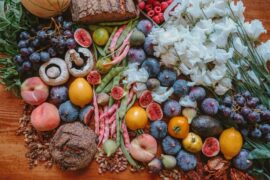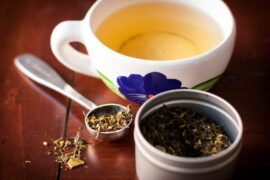We’ve all heard of the phrase ‘superfood’, but what does this label actually mean?
Well, as it turns out, not a lot!
Superfoods are a relatively new concept and although there is no official scientific evidence to support the term, it has generally come to be accepted that these foods are higher in nutritional value than other foods. Unfortunately, because the superfood category is such an unregulated one, it means anyone can use the label of superfood on their products, something which Andy Bellatti, a registered dietician, knows all about; “The field of nutrition is primed for these gimmicks because manufacturers know there are a lot of people looking for silver bullets. The term ‘superfood’ as we know it today is silly because it is basically code for ‘grown 15,000 miles away in a remote mountain range and sold at a premium’.”
It is very naive to believe that certain foods hold the power to, for example, slow down the ageing process, destroy diseased cells or make us more intelligent, because although some foods are definitely more beneficial to our health than others; hamburgers are never going to be healthier than, it is all about balance and variation. Many of the foods deemed ‘superfoods’ would only ever actually prove to be super if they were consumed in ridiculously, virtually impossible, sized portions. An example of this is garlic. Garlic contains a nutrient that scientist believe could help reduce cholesterol and blood pressure, but to see this benefit you would have to eat up to 28 cloves a day. Just imagine how difficult and unpleasant that would be for both you and anyone who came within ten feet of you. I mean, I love garlic, but really?! Alison Hornby, a dietician and spokesperson for the British Dietetic Association (BDA), backs this up, “No food, including those labelled ‘superfoods’, can compensate for unhealthy eating. If people mistakenly believe they can ‘undo’ the damage caused by unhealthy foods by eating a superfood, they may continue making routine choices that are unhealthy and increase their risk of long-term illness. When it comes to keeping healthy, it’s best not to concentrate on any one food in the hope it will work miracles. All unprocessed food from the major food groups could be considered ‘super’. All these foods are useful as part of a balanced diet.”
Now let’s take a closer look at some of the foods that have been labelled as superfoods and find out what they can supposedly do for our health:
ACAI BERRIES
Pronounced ah-SIGH-ee, these small purple berries are said to aid weight loss, fight against the dreaded signs of aging and even help fight cancer and heart disease. Whilst they do have particularly high levels of antioxidants, in particular anthocyanins, there is still very little scientific evidence to back up these claims. They are usually sold either in tablet form, as a powder or included as an ingredient within a juice or smoothie. They’re good for you yes, but in our opinion, no better for you than any other piece of fruit.
GOJI BERRIES
The popularity of these little red berries has soared beyond believe, to the extent where they are now a common sight on supermarket shelves. Native to Tibet and Inner Mongolia, goji berries have been used for centuries by Chinese herbalists to treat such ailments as poor circulation and to help boost the immune system, but like acai berries the effects are yet to be proven by science. They do however, contain high levels of vitamin C, which is great for the skin, eyes, heart and joints and they are also rich in plant-based antioxidants, so if you do include them in your diet it’s not going to be a bad thing. They can be bought as dried fruit, as a powder or as in ingredient in juices or smoothies. We like them dried, scattered over porridge or granola, or mixed with other fruits and nuts as a snack to keep us going on a busy, time poor day.
CACAO
Cacao, or to you and me, chocolate contains flavonoids, which have been proven to help lower blood pressure and improve blood flow to the brain and heart. Well, ok it’s not as nice as it actually sounds. As great as it would be to be given the green light to eat your favourite chocolate bar as often and as much as you like, it’s unfortunately not the kind of chocolate we’re on about. Cacao is the raw form of chocolate, so it has the strong flavour of chocolate, but is nowhere near as nice to eat, basically because it has had no fat, sugar or creamy milk added to it. The good news though, is that it only contains 15 calories per tablespoon and almost no fat, so if you are a bit of a chocoholic try mixing some cacao powder into a smoothie for a deliciously smooth, velvety taste.
CHIA SEEDS
The Aztecs were reported to have eaten chia to help with endurance and energy levels and this is being used today to help sell these nutty tasting seeds. Native to Mexico, chia seeds swell when they come into contact with water, which means they are great at making you feel full and therefore prevent overeating. They are incredibly versatile and can be used in both sweet and savoury dishes. Our particular favourite is chia seed porridge, which fills us up so much we don’t even think about food again until it’s time for lunch. These tiny seeds are packed with omega-3 fatty acids, fibre and calcium and their slow energy release helps prevent blood sugar spikes.
MACA POWDER
Maca is a root vegetable that is grown in the Andes. The locals call it an adaptogen, which basically means it can help you to adapt to and cope with the stresses and strains of everyday life. It has a very rich, malty taste that works particularly well in porridge. Again, health benefits remain unproven, but advocates of maca powder believe it to boost energy, endurance, lower stress and even act as an aphrodisiac.
MATCHA
Matcha is the powdered leaf of the green tea plant and is found not only in health food shops and supermarket shelves, but also in our high street coffee shops where it is being used more and more frequently in the latest drink fads. It is filled with antioxidants and contains the stress busting amino acid, L-theanine. So, next time you fancy a coffee, why not try something a little different and ask for a matcha tea instead.
SPIRULINA
With a name that sounds like some kind of tropical disease it’s not doing much to get our taste buds salivating, but apparently this wonder plant is great at detoxifying and energising and with 300% more protein than fish or meat, it is an excellent source of protein for vegetarians and vegans. Spirulina is also packed full of chlorophyll, minerals, vitamins, particularly the B vitamins, and iron and tastes great sprinkled over salads or as a powder mixed into water or juices.
There are also some new superfood names to look out for in your local supermarket, these include:
- Camu Camu – it has 50 times more vitamin C than oranges, and can therefore help boost the immune system and fight off colds.
- Lucuma – it is a natural low GI sweetener that doesn’t affect the body’s blood sugar levels. It is also full of minerals, which can increase vitality.
- Moringa – is a green leaf, similar to spinach, which helps curb hunger and stimulates the metabolism.
- Maqui berries – these are good for cardiovascular health and can reduce levels of bad cholesterol.
Whatever your opinion on superfoods there is no denying that eating as cleanly, as naturally and as healthily as possible is the best way to ensure your body grows, maintains and lasts as long as it possibly can. No one food can truly be a superfood, as surely to be a superfood it would mean you could healthily exist on that one food alone, which just isn’t realistic. A healthy diet should be based on the ‘eatwell’ plate, which advocates eating the right balance of each food group in the right quantities. So, in answer to the question in the title, no so-called superfoods are not actually that super after all, but if you eat them within a healthy, varied diet then yes they are going to do you some good.


































